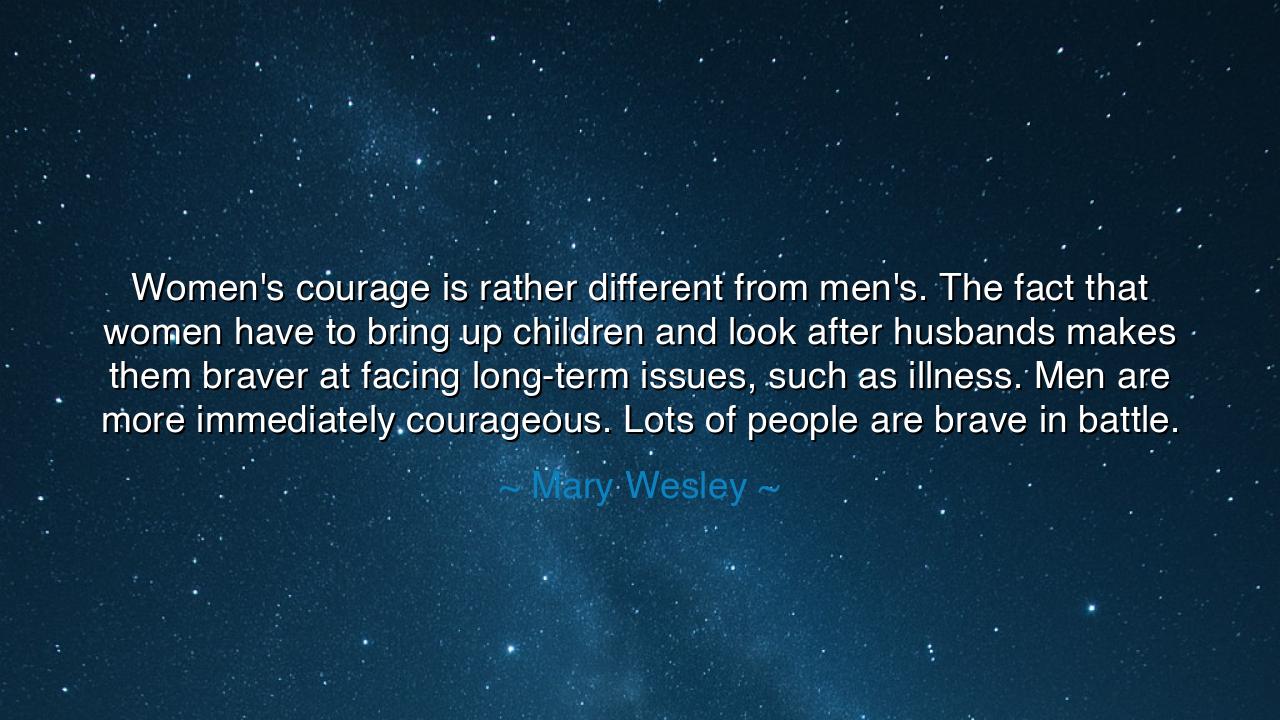
Women's courage is rather different from men's. The fact that
Women's courage is rather different from men's. The fact that women have to bring up children and look after husbands makes them braver at facing long-term issues, such as illness. Men are more immediately courageous. Lots of people are brave in battle.






When the novelist Mary Wesley declared that “Women’s courage is rather different from men’s. The fact that women have to bring up children and look after husbands makes them braver at facing long-term issues, such as illness. Men are more immediately courageous. Lots of people are brave in battle,” she touched upon a truth as old as humanity itself—the dual faces of courage, one sudden and blazing, the other quiet and enduring. Her words remind us that bravery is not born of gender, but of circumstance, of duty, and of love; yet the ways it manifests differ like lightning and the steady flame of a hearth. One kind strikes in an instant of peril; the other burns unceasingly through years of care and endurance.
In the ancient world, warriors were praised for their courage on the battlefield. Their songs and statues glorified those who faced death with defiance. Yet in the silent chambers of home, women bore their own battles, unwritten by history. They tended the wounded, bore the children, and kept the flame of civilization alive when the men marched to war. Wesley’s words restore the forgotten honor of this quieter courage—the courage of patience, of constancy, of compassion. It is not the roar of the lion, but the strength of the earth itself, holding life steady through the passing storms.
For men’s courage, as Wesley describes, often bursts forth in moments—a flash of heroism, the quick decision to face danger, to stand and fight. Such bravery is glorious and vital, for it saves lives and shapes destinies. Yet women’s courage is of another kind: it is the courage to wake each day to duty, to bear pain without applause, to nurture in the face of loss, to stand steadfast when others falter. It is the courage to endure, not for an hour, but for a lifetime. This is not the courage of conquest, but the courage of continuance, and in it lies the very heartbeat of humanity.
Consider the story of Florence Nightingale, who walked among the dying soldiers of the Crimean War, not as a warrior, but as a healer. Amid filth, disease, and despair, she did not wield a sword, but a lamp—and by that lamp’s light, she gave hope to the hopeless. Her courage was not of the moment, but of the endless night. She faced not the enemy’s weapon, but the creeping hand of death that touched thousands. Yet she stood firm, guided by compassion and resolve. That is the essence of women’s courage—a strength born not of defiance, but of devotion.
Even in our own homes, we see this truth played out in countless, unheralded acts. A mother caring for a sick child through sleepless nights, an elderly woman tending to her ill husband with unwavering tenderness, a teacher holding faith in the hearts of children who the world has forgotten—all are warriors of a gentler kind. Their battles are not fought with blood and fire, but with patience and love. Yet without them, the victories of men would crumble into dust, for what is courage that saves a day compared to courage that sustains a life?
Wesley’s insight teaches us that courage wears many faces. The world often honors the bold and the sudden, yet it forgets the quiet heroes who hold the line of life itself. The one who rushes into danger is brave indeed; but the one who stands faithful amid sorrow, weariness, and slow decay is braver still. Both are necessary. Both are noble. For just as lightning and sunlight are both born of the same fire in heaven, so too are immediate courage and enduring courage born of the same soul.
Therefore, let us learn to honor every form of bravery—the soldier and the nurse, the hero and the healer, the protector and the nurturer. Let us remember that courage is not measured by noise or spectacle, but by steadfastness of heart. Be brave not only in moments of crisis, but in the long seasons of quiet struggle. When life demands patience, meet it with strength; when others falter, hold fast; when the burden grows heavy, lift it again with love. For the truest measure of courage, as Mary Wesley reminds us, is not how one faces death, but how one sustains life.
Thus, my child of thought and spirit, take this wisdom as your inheritance: bravery has two wings—the swift and the enduring. Honor both within yourself. Be bold in the moment of battle, but be steadfast in the long night of care. For the flame that burns slowly may yet outlast the fire that blazes bright. And in that quiet flame, tended daily with love, you shall find the deepest, most eternal form of courage.






AAdministratorAdministrator
Welcome, honored guests. Please leave a comment, we will respond soon